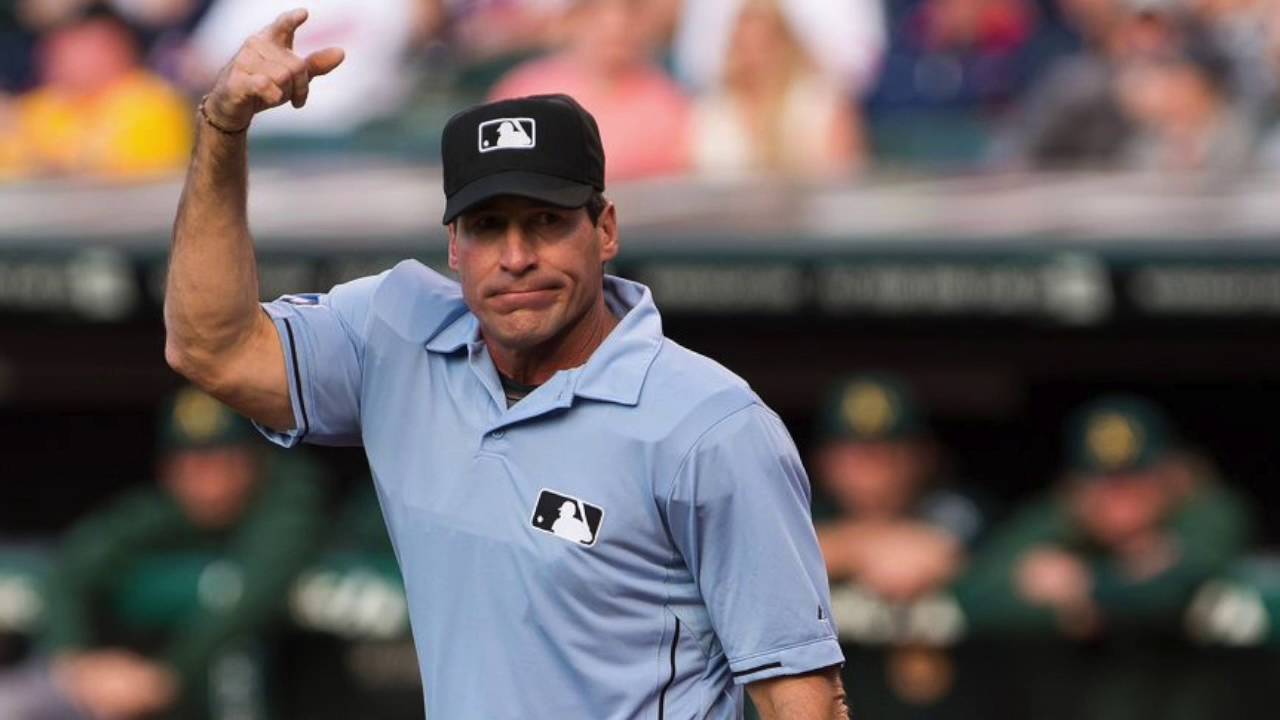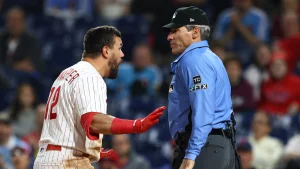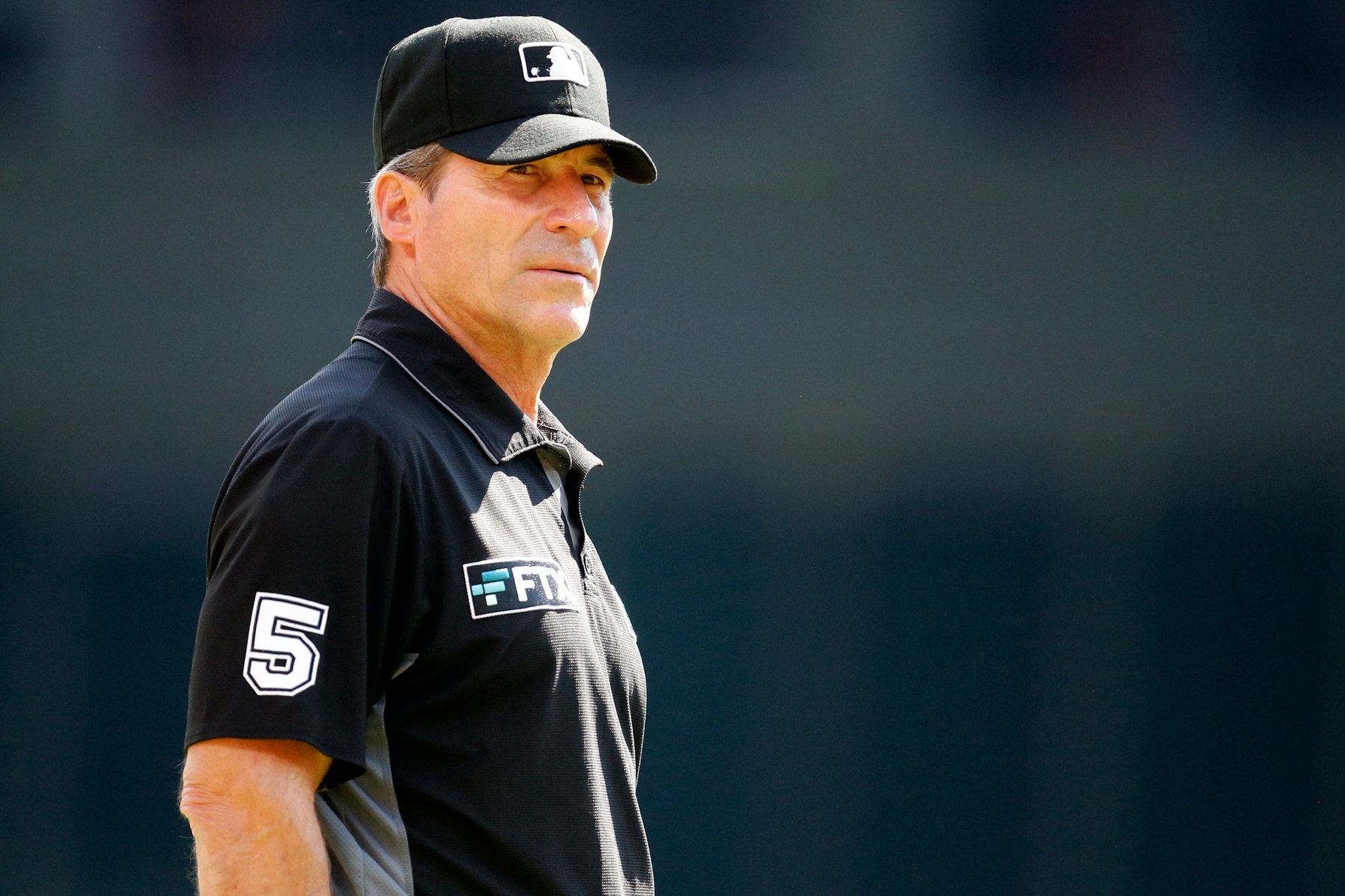After three decades in Major League Baseball (MLB), umpire Ángel Hernández has announced his immediate retirement. This marks the end of a career that has been as contentious as it has been lengthy, punctuated by high-profile disputes, questionable calls, and significant lawsuits.
A Career Spanning Over Three Decades
Ángel Hernández, now 62, confirmed his retirement in a statement, corroborating earlier reports of his decision to step down. Since debuting in 1991, Hernández has officiated thousands of games. His departure comes after reaching a settlement with MLB, ending his tenure in the sport.
Hernández officiated his last game on May 9 and was subsequently replaced on Lance Barksdale’s crew by Jacob Metz.
Legal Battles and Allegations of Discrimination

In 2017, Hernández made headlines by suing MLB, accusing the league of racial discrimination. He argued that he had been overlooked for promotions and prestigious assignments due to his heritage. However, the district court dismissed the case, a decision upheld by an appeals court in the following year. Hernández alleged that MLB executive Joe Torre, responsible for umpire management, had a personal bias against him, describing Hernández’s style as “overly confrontational.”
A History of Controversial Calls
Hernández’s career has been marred by numerous contentious calls, making him a frequent target of criticism from players, fans, and the media. Notably, during a 2018 playoff game, three of his calls were overturned by replay within the first four innings. Such incidents contributed to his notoriety and the growing disdain among baseball enthusiasts.
Recent examples include a game this season where he called three strikes on pitches well off the plate from Houston’s J.P. France to Texas’ Wyatt Langford. In 2022, Philadelphia’s designated hitter Kyle Schwarber was ejected by Hernández after reacting vehemently to a called strike three on a pitch from Josh Hader that was off the plate. These high-profile errors became a staple of Hernández’s career, amplifying the scrutiny he faced.
Social Media and Fan Reactions
In the age of social media, Hernández’s mistakes were often magnified, turning him into a frequent subject of online vitriol. His penchant for controversial calls ensured that his name trended regularly, making him one of the most maligned figures in the sport. Despite the criticism, Hernández remained popular among his peers, who supported him amidst increasing scrutiny on umpires.
The Changing Landscape of Umpiring
Hernández’s retirement comes at a time when umpiring is undergoing significant changes. The implementation of the pitch clock and other pace-of-game measures has increased the demands on umpires. Additionally, MLB is exploring the use of an automated ball-strike system, currently tested in the minor leagues and potentially set for the major leagues by 2026.
MLB Commissioner Rob Manfred recently emphasized the league’s efforts to evaluate and support umpires. “There is a really detailed evaluation system,” Manfred stated, noting that umpires undergo assessments mid-season and post-season, which impact their assignments and earnings.
A Mixed Legacy
Despite his long tenure, Hernández’s career was notably devoid of some of the most prestigious assignments. He had not worked a World Series game since 2005 and last officiated a league championship series in 2016. His lack of playoff assignments and failure to be promoted to crew chief were central to his lawsuit against MLB.
In his retirement statement, Hernández reflected on his career with gratitude: “Starting with my first Major League game in 1991, I have had the very good experience of living out my childhood dream of umpiring in the major leagues.” He expressed pride in his contributions to the diversity and inclusivity of the sport and his desire to spend more time with his family.
As Hernández steps away from the game, his departure marks the end of an era characterized by both significant contributions and considerable controversy. The debate over his legacy will likely continue among baseball fans and historians for years to come.
The Impact of Hernández’s Departure on MLB

With Hernández’s retirement, MLB loses one of its most recognizable and contentious figures. His departure may mark the beginning of a new era in umpiring, particularly as the league moves closer to integrating technology to assist or replace human umpires in calling balls and strikes.
The Future of Umpiring
The potential implementation of the automated ball-strike system. ABS is one of the most significant changes on the horizon. This technology, already being tested in the minor leagues, aims to improve the accuracy and consistency of calls, reducing the subjective element that has led to many of the controversies associated with umpires like Hernández. While ABS is not expected to be introduced in the major leagues until at least 2026, its adoption could fundamentally change the role of umpires in the game.
Reactions from the Baseball Community
Reactions to Hernández’s retirement have mixed, reflecting the divisive nature of career. Many fans and players have expressed relief, hoping for more consistent and reliable officiating in absence. However, within the umpiring community, there is a sense of loss. Hernández known for camaraderie and support among his colleagues, who often rallied around in the face of public criticism.
Commissioner Manfred’s Remarks
MLB Commissioner Rob Manfred’s recent comments highlight the league’s commitment to improving the standards and working conditions for umpires. The detailed evaluation system he described aims to ensure that umpires held accountable and continuously improve their performance. This system also emphasizes the physical and mental demands of the job, underscoring the importance of career management and support for umpires.
Hernández’s Influence on Diversity in Baseball
Hernández also leaves a legacy of promoting diversity within MLB. As one of the few Hispanic umpires in the league, he has been a visible representative of the sport’s efforts to become more inclusive. His career, despite its controversies, has highlighted the importance of diversity and the ongoing challenges faced by minority officials in professional sports.
Final Reflections
As Hernández steps away from the field, he does so with a complex legacy. His career has been a testament to the highs and lows of professional umpiring. While his decisions often sparked outrage, they also fueled discussions about the need for technological advancements and better support systems for umpires.
In his own words, Hernández expressed pride in his contributions and gratitude for the experiences and relationships he built over his career. “There is nothing better than working at a profession that you enjoy,” he stated, emphasizing his love for the game and the personal connections he made along the way.
Looking Ahead
The retirement of Ángel Hernández is a significant moment for Major League Baseball. As the league continues to evolve, the experiences and controversies of Hernández’s career will serve as important lessons for future generations of umpires. His departure underscores the need for ongoing improvements in officiating standards, technological integration, and support for diversity within the sport.




